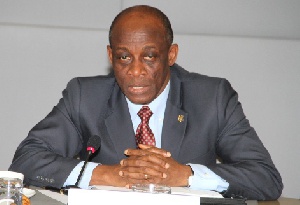 Seth Terkper, Minister of Finance
Seth Terkper, Minister of Finance
Several thousands of investors earned more than GHc815million from investing in government-backed securities alone in the first three months of the year, official figures have shown.
Analysis of figures available to the B&FT from the Central Securities Depository System -- the institution mandated to record the holdings of all securities in electronic form -- show that the government paid GHc815.7million as interest on debts to investors in the first quarter of this year, which is more than the state paid in the same period of last year.
Additionally, about GHc36billion of investment in government’s securities matured within the period this year, bringing the total sum of interest and maturity payments on government’s securities to GHc36.86billion.
In all 405,543 investors benefitted from the payments.
So far the total value of securities issued this year, including the Bank of Ghana bills and Cocoa Board bills, amounted to GHc35.45billion -- with the debts of government alone making up about GHc21.9billion.
According to the Ministry of Finance, the debt securities issued this year were aimed at raising money to finance maturing debts amid concerns that the debt-management strategy of the government, which the Finance Minister Seth Terkper has described as ‘Smart borrowing’ -- where funds are raised for projects that can pay for themselves -- could plunge the country back into the league of highly indebted poor countries.
Currently, Ghana’s debt position looks dire as excessive spending of government, rising interest cost, narrowed tax base of the economy coupled with macroeconomic challenges have impacted negatively on government’s tax revenue.
Nonetheless, appetite for government-backed securities is high among investors despite the Treasury yield, especially on the popular 91-day bill, declining consistently -- albeit at a slower pace -- from 25.2 percent in April last year to 22.8 percent at the end of April this year.
Currently, commercial banks are leading a pack of investors that have increased their exposure to government’s Treasury while tightening credit to the private sector and consumers.
Some banks have told the B&FT that they will shore-up their investment in Treasury bills and cut lending to businesses as long as interest paid on short-dated securities remains at or goes above the 23 percent.
The high interest payments on government debts have thus fuelled continued concerns the interest burden on state coffers, with the Institute of Fiscal Policy previously arguing that interest payments now exceed capital expenditure and could soon outstrip the public sector wage bill.
Global credit rating agency Fitch has also observed that Ghana’s interest burden is the highest among its rated sub-Saharan African countries, while other analysts have expressed worry over the escalating interest on the country’s debts.
As at the end of December 2015, the total public debt stood at GH¢97.2billion -- equivalent to 72.9 percent of GDP. Currently, however, the public debt level of government is not yet available, but the central bank says total domestic debt as at December last year was GH¢39.4billion, which is about 29.5 percent of GDP; while the external debt portion increased to GH?57.8billion, representing 43.4 percent of GDP.
- See more at: http://thebftonline.com/business/economy/19291/treasury-returns-ghc815m-to-investors-in-3mths.html#sthash.07Mo7rFM.dpuf